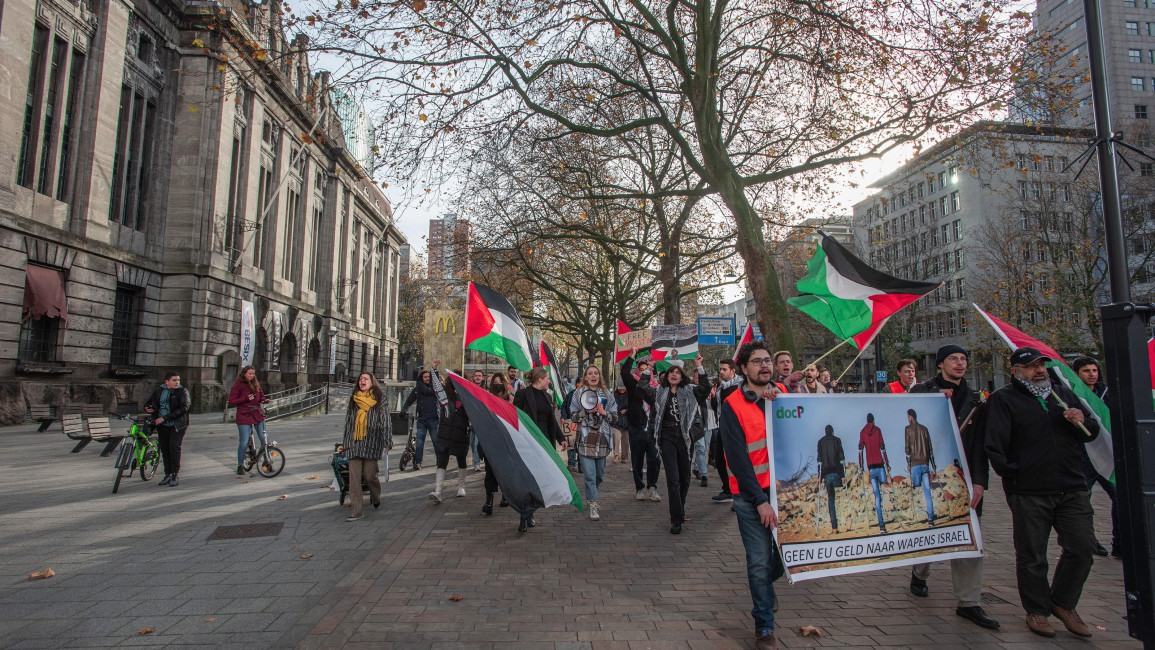Dutch university 'tried to ban' discussion on Israeli crimes against Palestinians
A student group at the Netherlands' Leiden University was barred from organising a panel discussion on Israeli crimes against Palestinians on Monday, forcing them to conduct the event off- campus.
I am very sorry to hear that Leiden University's management has cancelled a student-led event on Palestine next week. This is in clear breach of academic freedom and makes a mockery of the university's motto "praesidium libertatis".
— Christian Henderson (@CjvHenderson) March 17, 2022
The university had initially agreed to host Students for Palestine's 'Apartheid, racism & intersectionality' discussion, before backtracking on their decision just days before the event, according to Alice Garcia, Advocacy and Communication Officer at the European Legal Support Center (ELSC).
The event eventually took place at a cultural venue in the Hague, while other students protested in front of Leiden University.
A key difference between the students and university was reportedly the panel's chair - Dr. Dina Zbeidy, an anthropologist with experience working for human rights groups in Palestine and the Netherlands, according to activists.
My remarks to a panel discussion organized by Students for Palestine at Leiden University on the contradictory yet consistent Western responses to Russian and Israeli aggression. Includes intro on efforts by @UniLeidenNews and its rector @HesterBijl to ban the event https://t.co/Qc2A1h1uud
— Mouin Rabbani (@MouinRabbani) March 22, 2022
It is unclear why the university opposed Zbeidy’s attendance.
Leo Harskamp, head of security at Leiden University, who is reportedly close to the pro-Israel group Christians for Israel, claimed she was not neutral on the issue and therefore was unsuitable.
University rector Hester Bijl endorsed the decision to bar the event, despite tweeting: "Academic freedom lies at the heart of our university."
(1/4) Academic freedom lies at the heart of our university. I can empathize with concerns that have arisen about a debate (Students for Palestine) being cancelled. However, a debate in our community -particularly on a subject such as this- requires something from the organisers:
— Hester Bijl (@HesterBijl) March 19, 2022
Garcia slammed the university's decision as an "arbitrary restriction to the rights of freedom of expression and of assembly of the students".
"They (the university) provided no evidence on why Dr. Zbeidy would not be a good chair. They only vaguely referred to the university house rules without explaining why Dr. Zbeidy is not a 'good chair' as required per the house rules. Excluding her could amount to discrimination if the university did not apply the same standards to events recently organised on campus on other topics, such as Ukraine for instance," she told The New Arab.
This is not the first time Students for Palestine has clashed with the university's administration for organising events to raise awareness around the Israeli occupation, and is emblematic of a larger culture of censorship of pro-Palestinian voices, as detailed in an ELSC report from last year.
Layla, a Leiden University student and member of Students for Palestine, told The New Arab that the event was likely "not going to take place from the outset, and that the problem with (the chair) was just an excuse".
"They (the university authorities) will never talk about the content of an academic panel, but they will find an issue with the structure of the panel - what they have power over," she said.
Israel and pro-Israel activists have long dismissed accusations of Apartheid, however, the word has become increasingly associated with the Jewish state in public discourse.
Israeli forces have displaced thousands of Palestinian families from their homes since the country's creation in 1948 and continue to occupy the West Bank and besiege the Gaza Strip.
Israel has built hundreds of illegal settlements on Palestinian land, and its occupying forces routinely detain and violate the rights of Palestinians.


![President Pezeshkian has denounced Israel's attacks on Lebanon [Getty]](/sites/default/files/styles/image_684x385/public/2173482924.jpeg?h=a5f2f23a&itok=q3evVtko)



 Follow the Middle East's top stories in English at The New Arab on Google News
Follow the Middle East's top stories in English at The New Arab on Google News


